THE AMERICAS
The US administrations assertion that its dollar policy remains unchanged did little to clarify exactly what that policy is, analysts say.
President Bushs comments in early June that the dollar was devalued inappropriately and that the administrations policy is one favoring a strong dollar seemed friendly toward the greenback at first blush, says Marc Chandler, chief currency strategist at HSBC Bank USA in New York.
But upon closer inspection, the presidents remarks did not contain much new information, he says.
That Bush wants a stronger dollar does not mean he is prepared to authorize intervention to make it so. Rather,he wants a stronger dollar because he wants a stronger economy, Chandler says.
The presidents comments also seemed to differ considerably from what treasury secretary John Snow had indicated only a few weeks earlier.
At a Group of 7 conference in France, Snow called the dollars weakness a modest realignment.
The mere fact that the spokesman of the worlds most-liquid currency describes a 21% decline in the currency [against the euro in the past year] as modest is another sign of approval for the dollars decline, says Ashraf Laidi, chief currency analyst at MG Financial Group in New York.
The US administration is happy not only with the effect of the weak dollar on exporters bottom lines, but also with its reinforcing effect on the Federal Reserves easy monetary policy, Laidi says.
Snows tacit approval of the dollars decline and Japans continued intervention in the currency market to prevent the yen from strengthening further against the dollar reflect the return of a discord between the two nations currency policies, Laidi says.
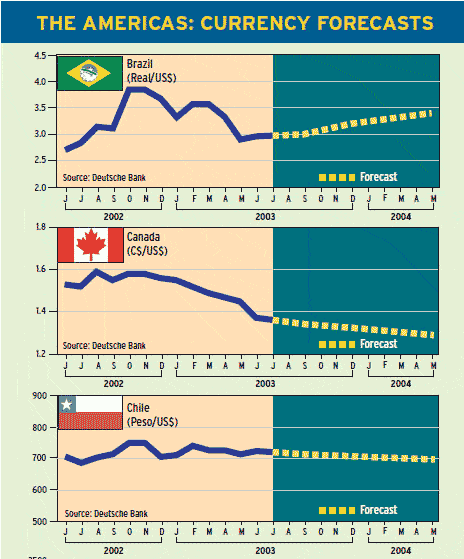
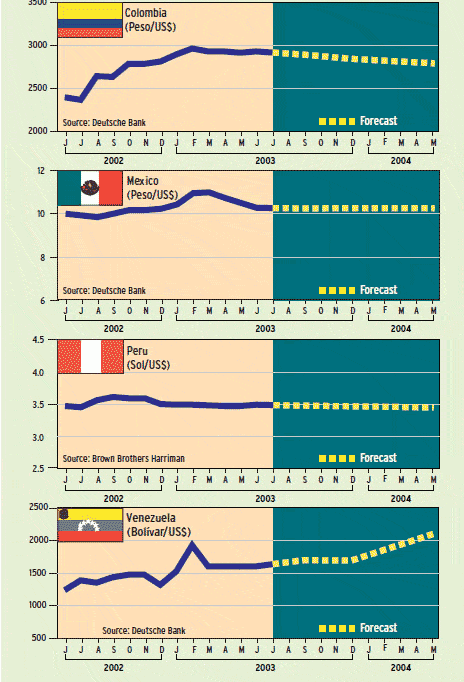
While a weaker dollar makes US goods more competitive in global markets, a potential slowdown in US demand for foreign goods and services risks triggering supply shocks in Asia and Europe, both of which are more export-dependent than the US, he says.
According to Laidi, a declining dollar would coincide with appreciating currency values in Europe and Asia, which would weigh on their exports and diminish their demand for US exports.
The euro soared to a record high of $1.1932 on May 27, surpassing the previous high of $1.1884 set on January 4, 1999, only a few days after 12 European nations irrevo- cably locked their currencies together.
The dollar appeared to be entering a holding pattern in early June 2003, however, as a rising US stock market and hopes for a pickup in US economic growth later in the year provided some support for the currency.
The combination of a decline in the US 10-year government bond yield and a weaker dollar is a good leading indicator of a big rise in US stock prices to come, says Michael Rosenberg, head of global foreign exchange research at Deutsche Bank in New York.
A strong economy and a strong US equity market could give the dollar a temporary lift, Rosenberg says.But over the longer run, a stronger US economy will contribute to wider US trade and current account deficits, which will make matters worse, he concludes.
EUROPE
UK Not Ready Yet To Adopt the Euro
The British pound fell sharply against both the euro and the US dollar on June 9 after studies conducted for the UK treasury suggested that sterling would need to weaken considerably more than the market anticipated before Britain could join the euro.
The pound fell more than a penny against the euro and two cents against the dollar within minutes after the studies were released.
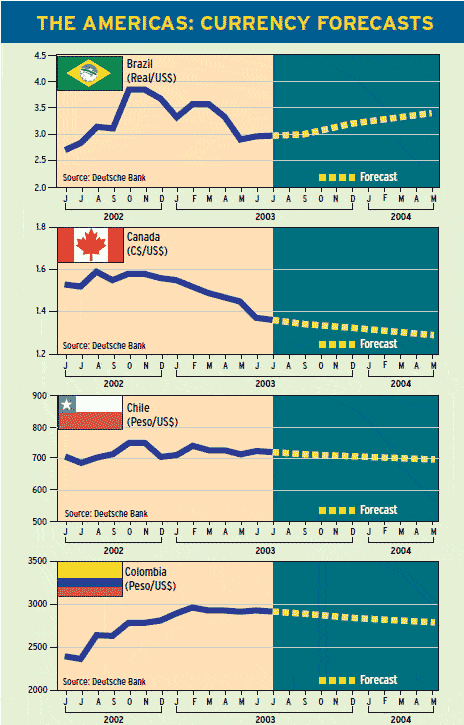
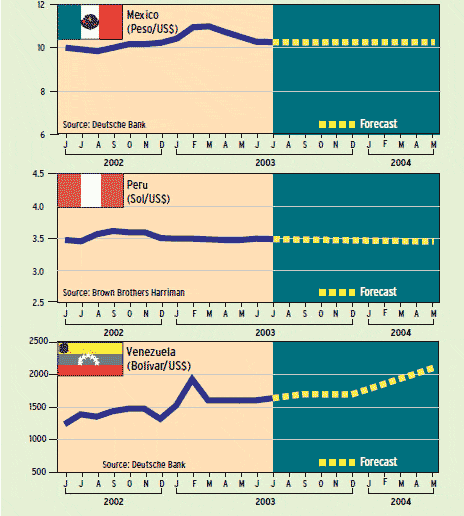
Chancellor Gordon Brown told members of Parliament that the UK had failed four of the five economic tests needed for entry into the monetary union.
Only the financial-services test was met, with the government concluding that the single currency would be good for UK banks and brokerage houses.
Academics invited by treasury to submit comments said it was too early to attempt a definitive judgment about the costs and benefits of participation in the euro.
The fact that the birth of the euro was painless is no pointer to the odds that the euro will have a long and successful life, said Willem Buiter, chief economist at the European Bank for Reconstruction and Development.
How the monetary unions growth and stability pact evolves will be a critical issue, according to Buiter. Getting the exchange rate right will be another. It is widely agreed that the D-mark was overvalued and the Irish punt undervalued when they joined the euro.
The UK chancellors no, not yet verdict was widely expected, says Nick Bennenbroek, currency analyst at Brown Brothers Harriman in New York.
But Brown offered support in principle for adopting the euro and said the government may reconsider the five tests next year.The chancellors comments were more pro-euro than expected, Bennenbroek says.
The government left open the possibility of a referendum on participation in the euro before the next general election. Brown said a bill would be announced this fall that could lead to a referendum next year.
Prime Minister Tony Blair said the government would work to build a strong pro- Europe consensus in Britain. But analysts say the likelihood of a yes vote is slim, judging by recent public-opinion polls.
Meanwhile, Poles voted by a substantial margin on June 7-8 to join the European Union. Poland is the largest of the 10 countries due to join the EU next year.
Because of its size, Poland will have the same weight in EU votes as Spain, but less than the UK, France and Germany.
ASIA
Philippines Seeks Currency Stability
Philippine President Gloria Macapagal-Arroyo, the only Asian leader to be feted with a state dinner by President Bush, says she makes business and investment promotion a component of every trip she takes.
Our foreign policy is serving to fight poverty in the Philippines, she says.
While meeting with the US president in May, Arroyo sought wider access for Philippine-made garments to the American market, noting that garment manufacturing is a labor-intensive industry.
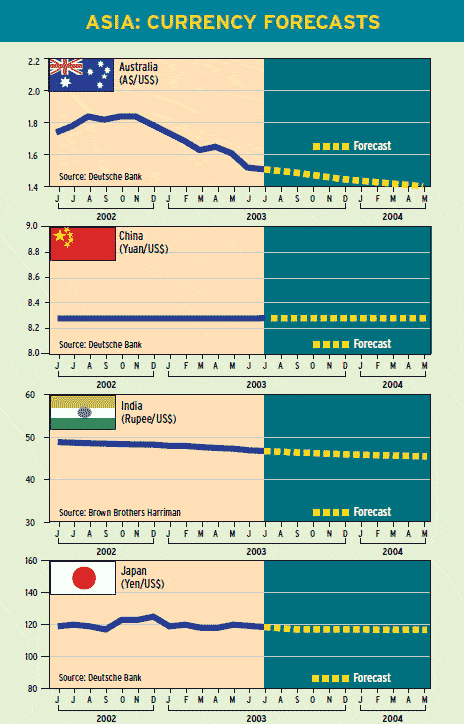
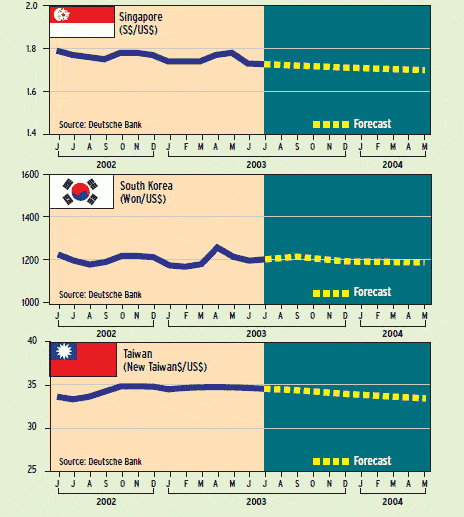
Garments and textiles are the Philippines second- biggest export earner after electronics.
The Philippines is also a premier destination for US business outsourcing, she says, noting that English is widely spoken in the Southeast Asian nation.
With a doctorate degree in economics from the University of the Philippines, Arroyo seemed at ease fielding questions from the US business press in New York.
She asserted that Philippine companies deserve to win contracts in rebuilding post-war Iraq, not only because of the Philippines role as a key US ally, but also because Filipino workers have a wealth of skills and experience working in the Middle East.
My decision to join the coalition of the willing was not popular at first, but people are beginning to see that it was the right decision,Arroyo says.
The Philippine peso weakened to 55 to the US dollar in early March, but it strengthened to around 52.50 after the Iraq war ended.
Philippine finance secretary Jose Camacho said he was very happy with the peso trading around 52.50 to the dollar, although the currency later retreated somewhat.
The Philippine central bank has been the only central bank in the region seen selling dollars, while all around others are buying, analysts say.
Gordon Platt



